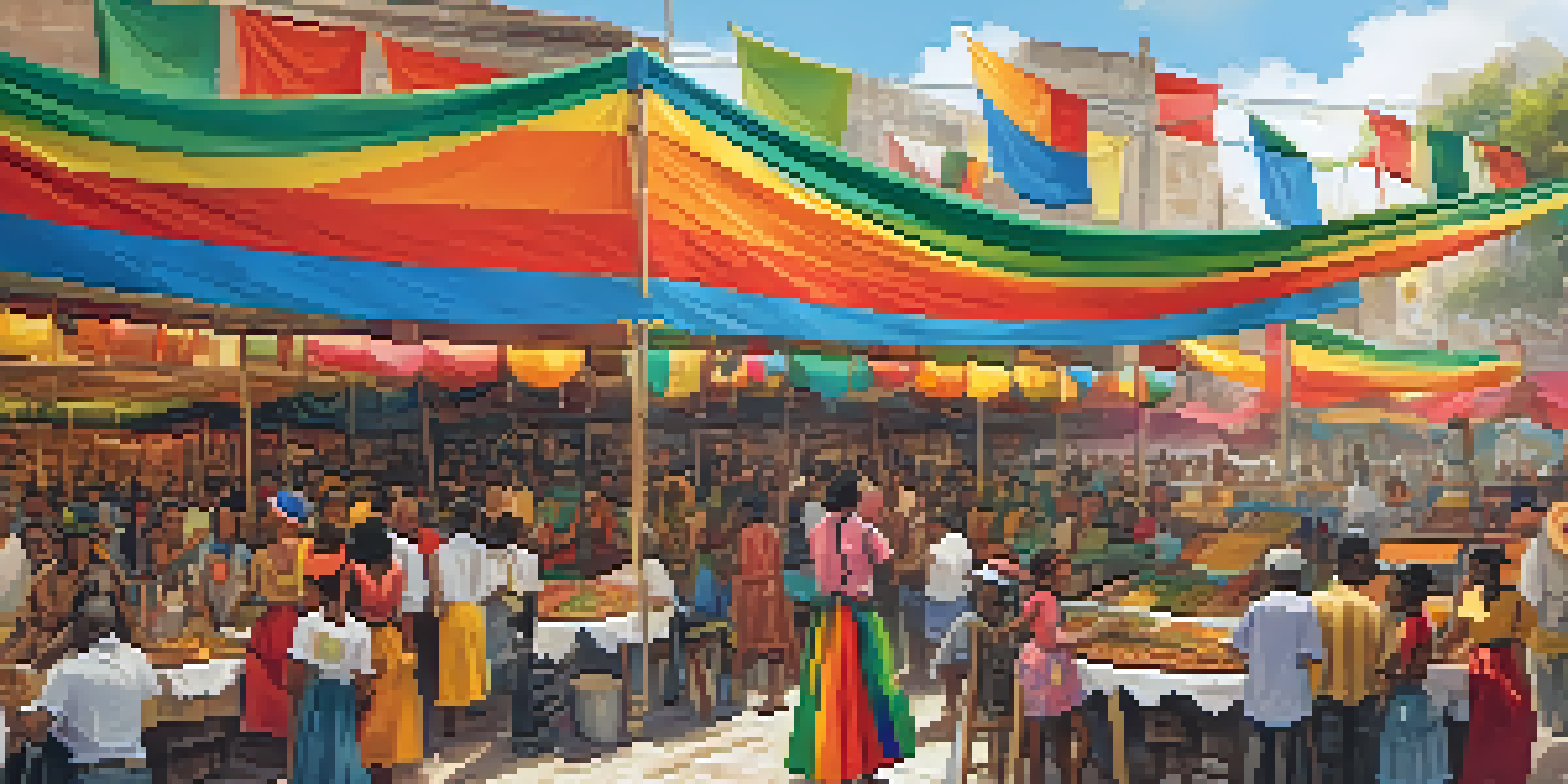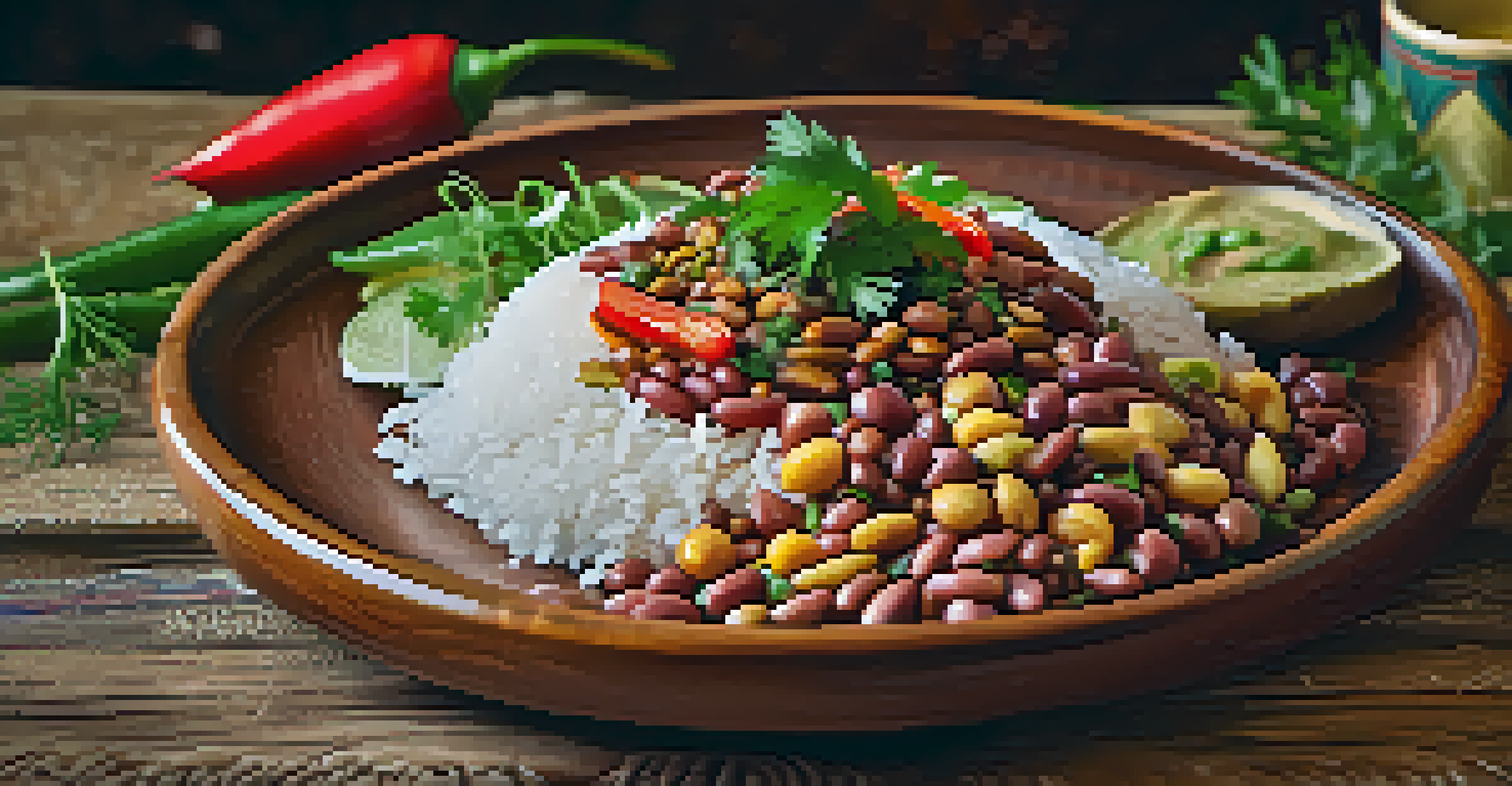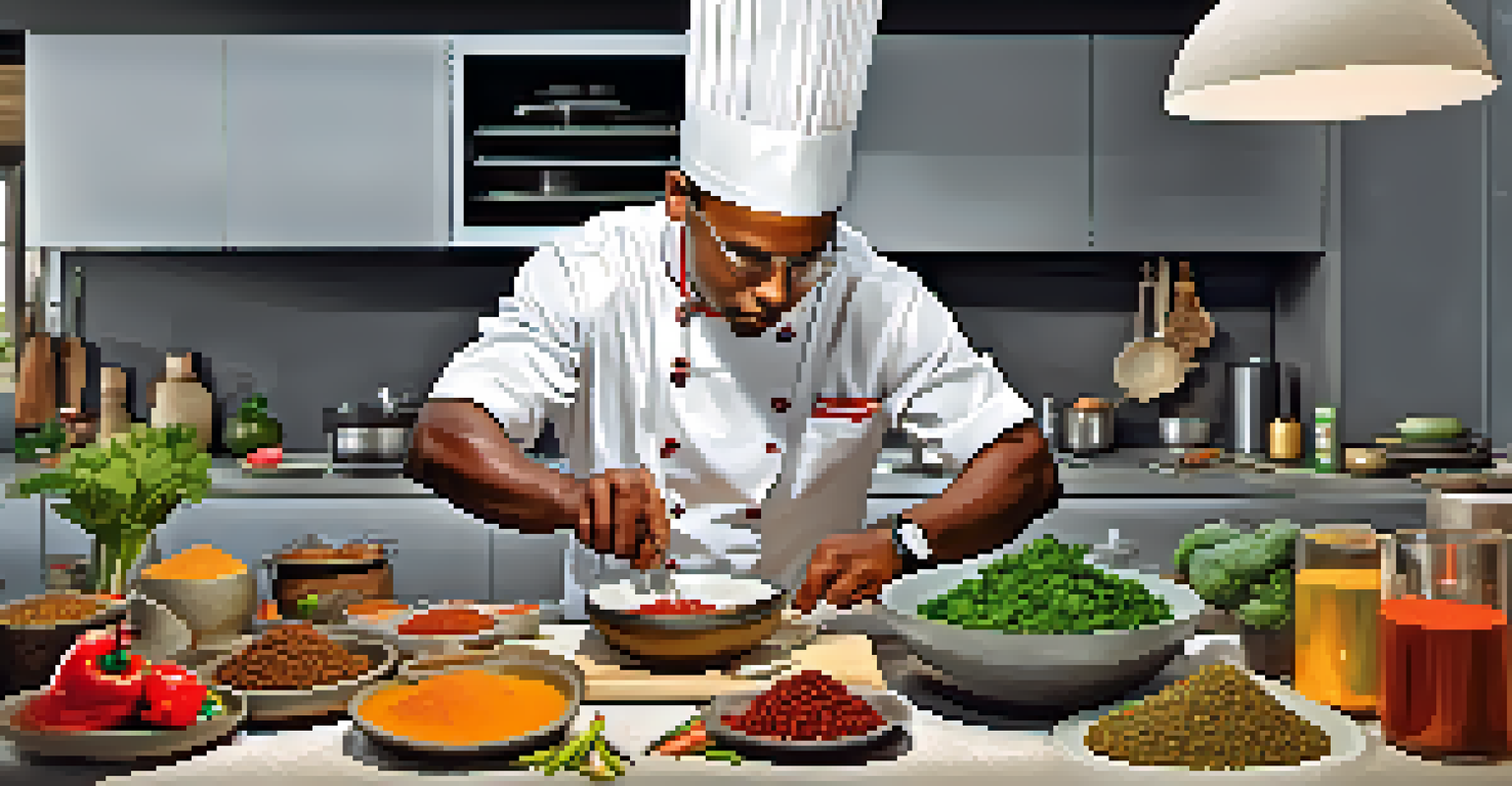African Heritage and Its Role in Peruvian Culinary Diversity

Understanding African Influence in Peru's History
The story of African heritage in Peru begins in the colonial era when enslaved Africans were brought to work on plantations. This migration introduced a wealth of culinary traditions that blended with Indigenous and Spanish influences. Over the centuries, these traditions evolved, creating a unique tapestry of flavors that defines Peruvian cuisine today.
Food is the universal language of culture; it tells stories, brings people together, and celebrates heritage.
Much like how a river merges with tributaries, African culinary practices flowed into the existing food culture, enriching it with new ingredients and techniques. For instance, the use of spices and the importance of community in cooking can be traced back to African traditions. This melding of cultures has led to the rich diversity of dishes we enjoy in Peru.
Understanding this historical context helps us appreciate the complexity of Peru's culinary identity. The contributions of African heritage are woven into the very fabric of Peruvian gastronomy, highlighting the importance of recognizing and celebrating these influences.
Key Ingredients from African Culinary Traditions
Several ingredients commonly found in Peruvian kitchens have African origins. For example, the use of peanuts, which are a staple in many traditional dishes, has roots in African cooking. Similarly, the flavor profiles of dishes often reflect the spices and cooking methods introduced by African descendants.

Incorporating these ingredients creates a fusion that elevates Peruvian dishes to new heights. Think of the way a painter uses different colors to create a masterpiece; the blending of African ingredients into Peruvian cuisine adds depth and richness. This not only enhances flavor but also tells a story of cultural resilience and adaptation.
African Roots in Peruvian Cuisine
African culinary traditions have significantly shaped the flavors and techniques found in modern Peruvian dishes.
As we explore these ingredients, we can see how they not only nourish the body but also connect us to a broader narrative of heritage and identity. This journey through taste reminds us of the power food has in bridging cultural gaps and celebrating diversity.
Signature Dishes Showcasing African Influence
Peru boasts several dishes that showcase African influence, with 'tacu tacu' being a prime example. This dish combines rice and beans, reflecting the resourcefulness of African cooks who utilized leftovers creatively. It's a delicious representation of how culinary traditions can adapt and thrive in new environments.
Culinary traditions are the threads that weave together the fabric of our identity.
Another notable dish is 'anticuchos,' skewers traditionally made from beef heart, often seasoned with spices that echo African flavors. This street food staple is a testament to the way African heritage has permeated everyday Peruvian life, transforming simple ingredients into flavorful experiences. Each bite carries with it a history of survival and innovation.
These dishes not only fill our stomachs but also serve as cultural artifacts, connecting diners to a rich heritage. Enjoying them is like taking a flavorful journey through time, exploring the intersections of culture, identity, and culinary art.
Cultural Festivals Celebrating African Heritage
Cultural festivals in Peru play a pivotal role in celebrating African heritage, with events like the 'Festival del Son Afroperuano' showcasing music, dance, and, of course, food. These festivals not only bring together communities but also educate others about the significant contributions of Afro-Peruvians to the national identity.
At these vibrant gatherings, you can experience traditional African-influenced dishes firsthand, alongside performances that highlight the rich cultural legacy. It’s a joyous celebration that fosters a sense of pride and belonging among Afro-Peruvians. Imagine a colorful tapestry of people, flavors, and sounds coming together in harmony.
Celebrating Afro-Peruvian Culture
Cultural festivals and the work of Afro-Peruvian chefs highlight the vibrant heritage and ongoing contributions of African descendants to Peru's identity.
Participating in these festivals is like stepping into a living museum where history is experienced through taste and rhythm. It’s a reminder of how food can be a powerful vehicle for cultural expression and understanding.
The Role of Afro-Peruvian Chefs Today
Afro-Peruvian chefs are at the forefront of redefining traditional dishes, incorporating modern techniques while honoring their roots. These culinary artists are not just cooking; they are storytellers, using food to share their heritage with the world. Their innovative approaches breathe new life into classic recipes, making them relevant in contemporary cuisine.
By showcasing African ingredients and cooking methods, these chefs help preserve a vital part of Peru's culinary history. They are like gardeners tending to a rich garden of culture, ensuring that the roots of African heritage continue to thrive. This dedication fosters a greater appreciation for the diversity and complexity of Peruvian gastronomy.
Their work also paves the way for future generations, inspiring young chefs to explore their identity through food. As they blend tradition with innovation, they create a dialogue that bridges the past and the future, ensuring that the legacy of African heritage remains vibrant.
Challenges in Preserving African Culinary Heritage
Despite the rich contributions of African heritage to Peruvian cuisine, there are challenges to its preservation. Many traditional recipes and cooking techniques risk being forgotten as modern influences take precedence. This is akin to a once-vibrant tapestry losing its colors, as fewer people engage with their cultural roots.
Additionally, the underrepresentation of Afro-Peruvians in the culinary scene can pose a barrier to broader recognition of their contributions. This lack of visibility often leads to a diminished appreciation for the cultural significance behind the dishes. It’s essential to shine a light on these voices and their stories.
Challenges to Culinary Heritage
Despite rich contributions, the preservation of African culinary heritage faces challenges, including underrepresentation and the risk of forgotten traditions.
Efforts are underway to elevate Afro-Peruvian cuisine, but it requires collective action and awareness. By supporting initiatives that promote these culinary traditions, we can help ensure that this important aspect of Peru’s identity continues to be celebrated and cherished.
The Future of African Heritage in Peruvian Cuisine
Looking ahead, the future of African heritage in Peruvian cuisine is filled with promise and potential. As more people recognize and appreciate this rich tapestry of culture, there is an opportunity for growth and innovation. It’s like planting seeds in fertile soil, where new ideas can flourish and create a vibrant culinary landscape.
Emerging chefs and food enthusiasts are increasingly eager to explore the intersections of heritage and modern cuisine. This enthusiasm can lead to a revival of traditional dishes, reimagined with contemporary flair. The blending of old and new serves as a reminder of how dynamic and evolving food culture can be.

Ultimately, the future lies in collaboration and celebration, as diverse voices come together to enrich the culinary narrative. By valuing and promoting African heritage, we can ensure that it remains an integral part of Peru's diverse culinary identity for generations to come.